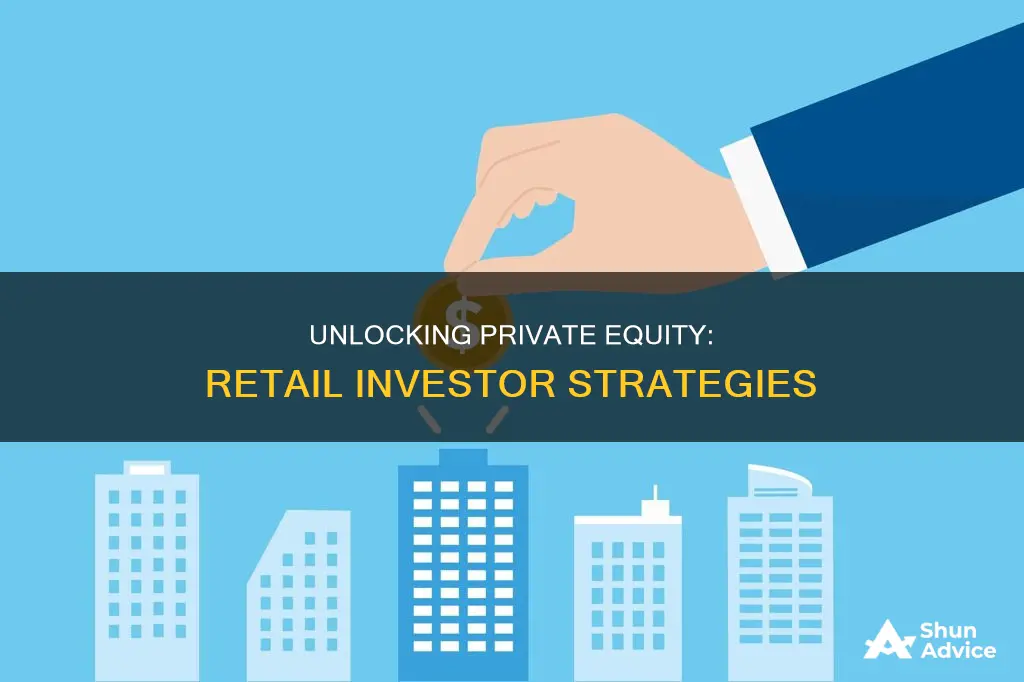
Private equity has long been an investment opportunity reserved for high-net-worth individuals and institutional investors. However, the landscape is changing, and private equity is now more accessible to retail investors. This shift has been driven by a combination of factors, including the pursuit of new avenues for growth by private equity firms, the increasing popularity of alternative investments, and regulatory changes. Retail investors, who account for half of all wealth globally, are attracted to private equity as a means of diversifying their portfolios and accessing potentially higher returns. However, it is important for retail investors to carefully navigate the challenges and risks associated with private equity, including high minimum investment requirements, illiquidity, and lack of transparency.
| Characteristics | Values |
|---|---|
| Definition | Investment funds that purchase and manage companies, then sell them |
| Investor Type | High-net-worth individuals and institutional investors |
| Returns | Higher potential returns compared to public market investments |
| Risk | High-risk, illiquid, lack of transparency |
| Investor Criteria | Net worth exceeding $1 million or annual income of over $200,000 in the last two years |
| Minimum Investment | Typically $25 million, can be as low as $250,000 or even $25,000 |
| Holding Period | At least 10 years |
| Non-direct Investment Options | Funds of funds, ETFs, SPACs, crowdfunding |
| Fees | Management fees (1-2% annually), performance fees (20%), additional expenses |
| Recent Developments | Blockchain technology, securitization, crowdfunding |
What You'll Learn

Understanding the role of accredited investors
Accredited investors play a crucial role in private equity investments. They must meet specific criteria to participate in private equity funds, which offer the potential for higher returns compared to traditional public market investments. To qualify as an accredited investor, an individual must have a net worth exceeding $1 million, excluding their primary residence, either individually or jointly with a spouse. Alternatively, they must have earned an annual income of over $200,000 in each of the last two years, with a reasonable expectation of earning the same or a higher income in the current year.
Accredited investors enjoy privileged access to a broader range of investment opportunities, including private equity funds, pre-IPO companies, venture capital companies, hedge funds, angel investments, and various complex and higher-risk deals. These funds often come with high minimum investment requirements, making them exclusive to accredited investors. By meeting the established criteria, accredited investors can benefit from the potential returns and diversification that private equity investments offer.
The Securities and Exchange Commission (SEC) in the United States recognises accredited investors as qualified to invest in complex or sophisticated types of securities that are not closely regulated. The SEC's definition of an accredited investor is crucial in determining who is eligible to invest in many early-stage companies. The regulations for accredited investors vary among jurisdictions, and it is essential to refer to the specific rules in your region.
The process of becoming an accredited investor does not involve a formal application or certification. Instead, the companies issuing unregistered securities determine a potential investor's status by conducting due diligence before the sale. The burden of proving an individual's accredited investor status falls on the investment vehicle rather than the investor. It is the responsibility of the company offering a private placement to ensure that all participants are accredited investors.
Being an accredited investor comes with pros and cons. The advantages include access to unique and restricted investment opportunities, high returns, and increased diversification. On the other hand, the disadvantages include high risk, high minimum investment amounts, high fees, and illiquidity of the investments. It is important to carefully consider these factors before pursuing accredited investor status.
Fidelity Investments: Understanding Their Fee Structure Better
You may want to see also

Alternative routes to private equity for retail investors
While private equity has traditionally been the domain of high-net-worth individuals and institutional investors, alternative routes have emerged that make this asset class more accessible to retail investors. Here are some options for those seeking to invest in private equity indirectly:
- Publicly-Traded Private Equity Firms: Retail investors can purchase shares of publicly-traded private equity firms on stock exchanges. This provides access to the private equity asset class without the high minimum investment requirements of traditional private equity funds. It also offers the benefits of potential diversification and higher returns, along with the ability to easily buy and sell shares on the stock market.
- Platform-Based Private Equity Investments: Online platforms provide retail investors with access to private equity opportunities, often with lower minimum investment requirements. These platforms offer a range of private equity funds and investment choices, enabling investors to select investments aligned with their risk tolerance and goals. They also provide valuable information, tools, and resources to support informed decision-making.
- Funds of Funds: This approach involves investing in a fund that holds shares of multiple private partnerships investing in private equities. It increases cost-effectiveness, reduces minimum investment requirements, and enhances diversification. However, it adds an extra layer of fees paid to the fund manager.
- Exchange-Traded Funds (ETFs): Retail investors can purchase shares of ETFs that track an index of publicly traded companies investing in private equities. There are no minimum investment requirements, but ETF investments may incur brokerage fees or commissions.
- Special Purpose Acquisition Companies (SPACs): SPACs are publicly traded shell companies that make private equity investments in undervalued private companies. However, they can be risky due to potential lack of diversification and pressure to meet investment deadlines.
- Crowdfunding: Crowdfunding platforms allow retail investors to contribute relatively small amounts to private equity ventures. It is important for investors to participate as investors rather than donors to ensure a potential return on their investment.
- Secondary Market Platforms: These platforms enable investors to purchase existing shares in private equity funds, including those of companies that have not yet gone public and are in early growth stages. Transactions on these platforms are typically faster and incur lower fees compared to public exchanges.
- Regulation A+ Exemptions: This regulation allows small businesses to sell shares to the general public, enabling anyone to invest in a company through crowdfunding. It also permits companies seeking equity funding to advertise their offerings publicly.
It is important to note that investing in private equity carries risks, including high minimum investment requirements, illiquidity, and lack of transparency. Retail investors should carefully consider these factors and conduct thorough due diligence before making any investment decisions.
Opening an Investment Fund: A UK Guide
You may want to see also

The benefits of private equity investments
Private equity investments offer several advantages over public market investments. Here are some of the key benefits for retail investors to consider:
Diversification
Private equity provides an opportunity for investors to diversify their portfolios beyond traditional public market investments. By investing in private companies, retail investors can access a different asset class, which can help reduce overall portfolio risk. This diversification is particularly attractive given the indirect correlation between private markets and constantly fluctuating public markets, making private markets less volatile.
Higher Potential Returns
Private equity investments have the potential to generate higher returns compared to public market investments. The flexibility in valuations that private companies enjoy, as opposed to the strict accounting practices of publicly traded companies, contributes to this potential for higher returns. However, it's important to remember that private equity investments also come with higher risks, including illiquidity and lack of transparency.
Access to Top-Quality Asset Managers
Retail investors can benefit from the expertise of top-quality asset managers in the private equity space. These managers have a strong track record of delivering consistent returns and possess industry expertise that can help navigate the complexities of private markets. Their experience can be invaluable in identifying and evaluating investment opportunities, conducting due diligence, and managing the investments.
Long-Term Investment Opportunities
Private equity investments typically have longer investment horizons, often requiring a commitment of a decade or more. While this may be a challenge for investors seeking quick returns, it provides an opportunity for long-term value creation. Private equity firms focus on improving the operations and performance of the companies they invest in, which takes time and patience. This long-term approach can lead to significant value enhancement.
Innovation and Growth
Private equity firms often invest in innovative and high-growth companies, particularly in sectors such as technology, healthcare, and software. These investments play a crucial role in fostering innovation, supporting start-ups, and driving economic growth. Retail investors, through private equity, can participate in this exciting landscape and potentially benefit from the success of these dynamic companies.
Democratization of Investments
Private equity is becoming more accessible to retail investors, who account for half of all wealth globally. Initiatives such as Regulation A+ are opening up direct investment opportunities by allowing small businesses to sell shares to the general public through crowdfunding. This democratization of private equity allows a broader range of investors to participate in investment opportunities that were previously exclusive to high-net-worth individuals and institutional investors.
Diversifying Your S&P 500 Investments: Is It Worthwhile?
You may want to see also

How to get started with private equity investing
Private equity investing can be an attractive prospect for retail investors, offering the potential for higher returns compared to traditional public market investments. However, it is important to approach this alternative investment strategy with care. Here are some key considerations for getting started with private equity investing:
Understanding Private Equity
Firstly, it is crucial to understand what private equity is and how it works. Private equity involves pooling funds from investors to invest in private companies, often with the goal of improving their operations and ultimately selling them for a profit. Private equity firms manage these investments and play a crucial role in identifying opportunities, conducting due diligence, and managing the investments.
Researching Private Equity Firms
When considering private equity investments, it is essential to thoroughly research reputable private equity firms. Evaluate their track record, industry expertise, and reputation to make informed decisions. Look for firms with consistent returns across various market cycles and expertise in specific industries or sectors that align with your investment strategy.
Understanding Fees and Expenses
Private equity investments typically come with various fees and expenses. Management fees, carried interest, and other expenses such as legal fees and due diligence costs can impact your overall returns. Be sure to understand the fee structure and potential costs associated with investing in private equity.
Assessing Risk and Diversification
Private equity investing carries risks, including illiquidity and lack of transparency. These investments often have high minimum investment requirements and long lock-up periods, tying up your funds for extended periods. Additionally, the lack of transparency in private company valuations can make it challenging to assess the true value and risk of the investment. Diversification is key—consider how private equity fits into your overall investment portfolio and risk tolerance.
Exploring Alternative Routes
Traditional private equity funds may have high barriers to entry for retail investors. However, alternative routes exist, such as investing in publicly traded private equity firms or through platform-based private equity investments. These options can provide exposure to the private equity asset class with lower minimum investment requirements and improved liquidity.
Due Diligence and Professional Advice
Before committing to any private equity investment, conduct thorough due diligence on the opportunity and the private equity firm. Seek professional advice to gain a comprehensive understanding of the risks, suitability, and potential alignment with your investment goals and time horizon.
By following these steps, retail investors can lay a strong foundation for entering the world of private equity investing. It is important to approach this alternative investment strategy with a careful balance of risk and return, taking into account the unique challenges and considerations of private equity.
Hands-Off Investing: Fidelity's Passive Investment Strategies
You may want to see also

The risks of investing in private equity
Private equity investments offer the potential for higher returns compared to public market investments. However, they also come with a variety of risks that investors should carefully consider before committing. Here are some key risks associated with investing in private equity:
Illiquidity
Private equity funds are typically long-term investments with lock-up periods lasting several years. Investors must be prepared to have their funds tied up for an extended period, often at least ten years, before they can access their returns. The illiquidity of private equity investments can pose a challenge if investors need to quickly liquidate their assets or require more flexibility.
Lack of Transparency
Private equity investments involve privately owned companies, and information available to investors may be limited or subject to confidentiality agreements. This lack of transparency can make it challenging for investors to accurately assess the true value and risk of their investments. Due diligence and thorough research are crucial to mitigating this risk.
High Minimum Investment Requirements
Traditional private equity funds often have high minimum investment amounts, ranging from hundreds of thousands to millions of dollars. These high barriers to entry make private equity investments inaccessible to many retail investors, who may not meet the criteria of being accredited investors. Accredited investors are typically individuals with a net worth exceeding $1 million or an annual income of over $200,000.
Higher Fees and Expenses
Private equity investments often come with higher fees and expenses compared to conventional investments. Management fees, performance fees, and other expenses can reduce the overall returns for investors. It is important for investors to carefully consider and understand the fee structure before committing to a private equity fund.
Speculative Nature
Private equity investing is speculative and risky. There is no guarantee that the companies invested in will succeed, and limited protections are available if they fail. The success of private equity investments depends on various factors, including the performance of the companies, the effectiveness of the management team, and the overall market conditions.
Limited Track Record
Some private equity investment vehicles with lower minimum investment requirements are relatively new and do not have a long history for comparison with other investments. This lack of a track record can make it challenging to assess their potential for success and long-term performance.
Fidelity Investments: Operating Hours and More
You may want to see also
Frequently asked questions
Private equity is an investment strategy where funds are pooled from investors to purchase and manage private companies, which are then sold. Private equity firms manage their portfolio companies to increase their value and may also seek to derive value before exiting the investment.
Retail investors can now access private equity through alternative routes such as investing in publicly traded private equity firms, platform-based private equity investments, crowdfunding, and secondary market platforms.
Private equity investments carry several risks, including high minimum investment requirements, potential illiquidity, and lack of transparency. Private equity investing can also be very speculative, and there is no guarantee that the companies invested in will succeed.







